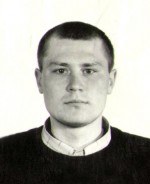Today the European Court of Human Rights (ECHR) passed Judgment in Dmitriy Ochelkov’s case. The Court found Russian authorities responsible for torture Dmitriy had been twice subjected to by policemen, and responsible for ineffective inquiry into his allegations of ill-treatment. But, because of expiry of the period of limitation no one is going to be held accountable. Unfortunately, the applicant did not live to see the restoration of justice, he died in September 2012.

(Photo: Dmitriy Ochelkov)
In 2002 Dmitriy Ochelkov, who was then 26 years old, applied to the Interregional NGO “Committee Against Torture” for legal support, informing that on 16 January 2002 he was detained by policemen who suspected him of car hijacking and taken to a police station, where he was urged to confess to the crime. The following actions were response to his refusal. One of the law enforces used handcuffs to fix the man’s hands behind his back, the other one tied Dmitriy’s hands and legs with a rope. Pleased with the job done, the policemen left the room, having left the detainee in the “swallow”* position.
*”Swallow” – is a method of torture, when a person’s hands and legs are tired with a rope or fixed with cuffs behind the back and together. A person may be hung by his hands and legs, beaten up, or kept in this position for a long time.
Following Dmitriy’s crime report, criminal proceedings were initiated which were then nine times discontinued and re-opened. Unlawful decisions to close the proceedings were quashed only after lawyers of the Committee Against Torture lodged complaints. Nevertheless, none of the policemen has ever been held liable.
On 14 February 2003 Ochelkov was again subjected to ill-treatment in the police. He was detained by the traffic police and taken to the Department of Interior Affairs of Balakhna city of Nizhny Novgorod region. There he was again interrogated under torture on suspicion of theft. Policemen battered him, put on a gas mask on him cutting off the air supply, and tortured with electrical current.
This time, the Prosecutor’s Office was dismissing Ochelkov’s requests to instigate criminal proceedings for five years. At last the proceedings were initiated, but adjourned in a short period of time. Again, no policeman was held liable for torture.
Having failed to attain effective investigation and restoration of violated rights of the applicant by national authorities, in 2005 lawyers of the Committee Against Torture lodged application with the ECHR. The Court had to examine several volumes of criminal proceedings pertaining to both incidents, so the court proceedings in the ECHR lasted for eight years.
The Russian Federation submitted explanations that can be summarized as follows: “when carrying out an inquiry into the applicant’s complaints, the investigative bodies considered and examined thoroughly all the applicant’s allegations, but there was no satisfactory proof of the alleged ill-treatment inflicted on him by police officers”. The State representative asserted that “in compliance with the Russian Code of Criminal Procedure the investigators had carried out all investigative measures necessary for the establishment of the truth in the case”.
The respondent State came to the conclusion that the multiple injuries diagnosed by doctors could have been sustained by Dmitriy “as a result of his own careless actions”. For instance, when getting into a police car “he was bumping against various parts of the car (a door, the car body) with his shoulders and other parts of his body”. Dmitriy could have sustained face injuries “falling down the stairs in the detention unit of the police station”. Russian authorities had no comment on the conclusion of Nizhny Novgorod investigators that Mr. Ochelkov, when being questioned by a police officer, “twice excused himself to the lavatory and both times hit his head against a bookshelf above his chair”.
It should be noted that the Russian Federation submitted to the Court only a small part of the materials of prosecutor’s inquiry. The biggest part of the materials submitted was a conviction against Ochelkov himself, passed by a domestic court, which had nothing to do with Dmitriy’s torture complaints.
One of lawyers with the Committee Against Torture, Anton Ryzhov, comments on the ECHR Judgment: “The ECHR established the fact of inhuman treatment towards Dmitriy on both occasions: in 2002 and 2003. What is more, the Judges unanimously held that the authorities had failed to investigate effectively the applicant’s ill-treatment complaints pertaining to the two incidents, and relentlessly criticized all the shortcomings in the domestic investigation. Mr. Ochelkov is to be payed 20 000 euros in respect of non-pecuniary damage. Unfortunately, Dmitriy had died by the time the Judgment was delivered. His relatives are to receive this compensation.
“It is logical that Russian authorities ought to consider the ECHR Judgment as newly discovered circumstance, and order an additional inquiry”, Anton Ryzhov continues, “But, I regret to state that the period of limitation has expired in respect of all the incidents. As for the investigators who sabotaged the investigation, they have either resigned from the job or retired”.